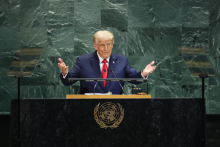
Donald Trump addresses the United Nations general assembly at the UN headquarters in New York City on 23 September 2025. Photograph: Michael M Santiago/Getty Images
Donald Trump repeatedly made false and misleading claims during his address to the United Nations general assembly on Tuesday.
Here are the facts on some of the false claims offered during Trump’s speech.
What Trump said: I want to thank the country of El Salvador for the successful and professional job they’ve done in receiving and jailing so many criminals that entered our country, and it was under the previous administration that the number became record setting, and they’re all being taken out.
Trump’s claims about immigrants deported to El Salvador and the Biden administration’s border control policies
The facts: Of the 238 Venezuelans deported to El Salvador’s sprawling so-called Terrorism Confinement Prison (Cecot) last March, the vast majority – around 90% – had no criminal record in the United States, numerous investigations by news organizations showed. Most of the exceptions had convictions for non-violent offenses like shoplifting and traffic violations. The administration had accused all the deportees of being members of the Venezuelan gang Tren de Aragua.
US Customs and Border Protection (CBP) documented a record number of encounters with undocumented immigrants at the southern border during Joe Biden’s presidency, before the number of entrants dipped sharply. But although the numbers of people with criminal records also increased, the percentage with prior criminal records did not reach record levels and in fact remained low.
Trump’s criticisms of the United Nations and his claims to have ended ‘seven wars’
What Trump said:
The UN has such tremendous potential. I’ve always said it. All they seem to do is write a really strongly worded letter and then never follow that letter up. It’s empty words, and empty words don’t solve war. The only thing that solves war and wars is action.
The president also repeated his claim to have “ended seven wars”.
Analysts have assessed the president’s claim to have “ended” several wars as highly problematic. For instance, while a ceasefire brokered with US and Qatari involvement ended 12 days of fighting between Israel and Iran in June, it followed Trump’s dramatic decision to bomb Iranian uranium-enrichment facilities in Fordow, Natanz and Isfahan that he had previously vowed to address through negotiations. Several analysts have publicly doubted that the disagreement over Iran’s nuclear ambitions has been resolved and warn that the conflict could reignite.
While White House intervention has ended outbreaks of fighting in other global hot spots – for example, between India and Pakistan over Kashmir, or Armenia and Azerbaijan over Nagorno-Karabakh – the agreements in many respects appear fragile, interim or unratified.
Meanwhile, Trump’s pre-election vows to end the long-running wars between Russia and Ukraine, and between Israel and Hamas in Gaza, remain unfulfilled.
Trump’s comments on Europe’s approach to immigration
What Trump said:
We’ve taken bold action to swiftly shut down uncontrolled migration. Once we started detaining and deporting everyone who crossed the border and removing illegal aliens from the United States, they simply stopped coming.
Trump also attributed immigration rates in Europe to a … :
… globalist migration agenda … It’s time to end the failed experiment of open borders. You have to end it now. Your countries are going to hell.
The facts: Shutting down uncontrolled migration has been a central claim for Trump since his inauguration and, indeed, illegal border crossings have dropped to their lowest level in decades in the first months of his presidency. But migration experts have warned that the issue is complex and that uncontrolled migration has not been ended. Furthermore, many of the administration’s remedies have suffered reversals in the courts.
The claim that European countries “are going to hell” thanks to an open border policy is emotive, subjective and, arguably, impervious to fact-checking. Many European nation states cite both cultural and economic benefits from immigration, despite the fact that tensions and challenges also result.
Furthermore, “open borders” is a problematic and misleading description, and European countries are not operating such a policy. Most European Union and Schengen agreement countries allow free movement and an absence of border checks at their internal borders but implement strict external border checks. Britain, where immigration remains a sensitive topic, ended freedom of movement and instituted a points-based immigration system when it left the EU in 2020.
Trump on the war between Russia and Ukraine
What Trump said:
Europe would … :
… have to join [the US] in adopting the exact same measures [tariffs on Russia] if the war continued.
You’re much closer to the city. We have an ocean in between. You’re right there, and Europe has to step it up. They can’t be doing what they’re doing. They’re buying oil and gas from Russia.
The EU has banned the import of seaborne Russian crude and refined products and plans to phase out energy imports from Russia by 2027. But this depends on unanimous approval for sanctions.
Trump’s comments about the climate crisis and efforts to address it
What Trump said:
He dismissed renewable energy projects and called climate change … :
… the greatest con job ever perpetrated on the world. All of these predictions made by the United Nations and many others, often for bad reasons, were wrong.
The facts: There is a broad scientific consensus that the earth has been heating up since the birth of the industrial revolution. A 2021 paper found that between 91% and 100% of all scientists agreed that human activity was causing the climate crisis.
Renewable energy products have been found to be effective, affordable and sustainable. Their use has the benefit of contributing to reduced carbon emissions characteristic of fossil fuel power plants that produce greenhouse gases.
By Robert Tait in Washington
Tue 23 Sep 2025 14.17 EDT
